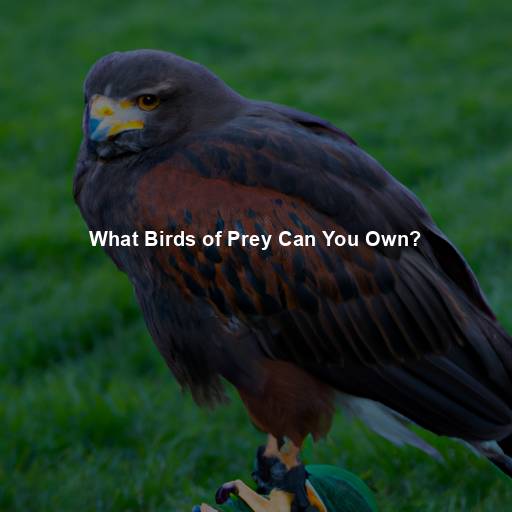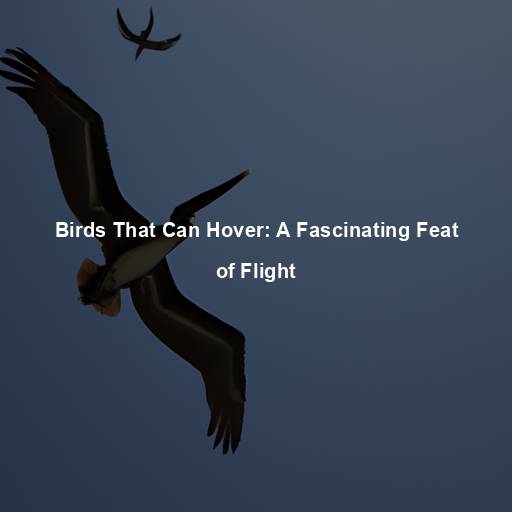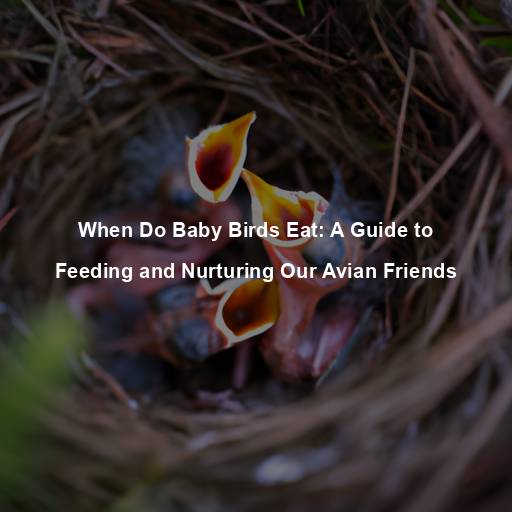What Birds of Prey Can You Own?
Last Updated on July 12, 2023 by Evan
Contents [hide]
- 1 Understanding Birds of Prey
- 2 Legal Considerations
- 3 The Challenges of Owning Birds of Prey
- 4 Alternative Ways to Engage with Birds of Prey
- 4.1 Visit Wildlife Rehabilitation Centers
- 4.2 Attend Falconry Events and Demonstrations
- 4.3 Volunteer at Avian Conservation Organizations
- 4.4 A Diverse Range of Species
- 4.5 Owls: Masters of Nocturnal Hunting
- 4.6 Eagles: Kings of the Skies
- 4.7 Falcons: Swift and Agile Predators
- 4.8 Hawks: Versatile Hunters
- 4.9 Vultures: Nature’s Cleanup Crew
- 5 The Ethical Debate: Owning Birds of Prey as Pets
- 6 The Importance of Conservation
- 7 Embracing the Wonder of Birds of Prey
- 8 FAQs: What Birds of Prey Can You Own?
Understanding Birds of Prey
For centuries, humans have been enchanted by the awe-inspiring magnificence of birds of prey, those regal creatures with razor-sharp talons, formidable beaks, and uncanny hunting prowess. They occupy a special niche in the grand tapestry of nature. However, the query of whether one can truly possess a bird of prey as a companion is a labyrinthine conundrum that defies simple explanation. Join us as we embark on a journey through the enigmatic realm of these majestic beings, foraging into the intricacies and boundaries of keeping them as domesticated companions.
The Definition of Birds of Prey
From the watchful gaze of the soaring eagle to the stealthy swoop of the hunting owl, birds of prey possess an impressive array of skills that make them the masters of the skies. With razor-sharp talons and piercing beaks, these majestic creatures embody the epitome of survival and dominance. Whether it’s the regal eagle or the fierce falcon, each member of this diverse group brings its own unique skills and characteristics to the table, ensuring the delicate balance of nature remains intact. As they traverse the skies, birds of prey serve as the guardians of ecosystems, diligently controlling the populations of their fellow creatures, from tiny insects to small mammals and reptiles, securing the perpetuation of life’s intricate puzzle.
Legal Considerations
Owning a bird of prey is no simple feat, as one must navigate the intricate web of legalities woven around these magnificent creatures. From the vast expanses of the United States to various countries worldwide, the wings of these birds are cloaked in layers of protection. Ecological importance and conservation efforts have bestowed upon these birds a special status, triggering laws and regulations that guard against their capture, trading, and unauthorized possession. The aim, of course, is to safeguard their existence in the untamed realms where they belong.
Permits and Licenses
Owning a majestic bird of prey is an extraordinary endeavor that requires navigating a labyrinth of permits and licenses. The intricate web of regulations can leave even the most intrepid bird enthusiasts feeling perplexed. Delving into this avian world demands thorough research and adherence to locality-specific guidelines, for each species has its own unique set of requirements. The bureaucratic path to securing ownership can be a meandering one, as authorities aim to ascertain the bird’s welfare and validate the owner’s expertise.
The Challenges of Owning Birds of Prey
Owning a bird of prey may seem like a thrilling notion, yet it’s vital to grasp the intricacies and hurdles entailed in caring for these regal creatures. These majestic avian predators come with unique requirements and behavioral patterns that can prove formidable for prospective owners.
Space Requirements
Birds of prey are naturally adapted to wide-ranging habitats, often requiring vast territories for hunting and nesting. Captivity can restrict their natural behaviors and may lead to physical and psychological issues. Providing adequate space for a bird of prey is crucial for its well-being. This means having a large aviary or mews that allows the bird to exercise, spread its wings, and engage in natural behaviors.
Specialized Diet and Nutrition
Keeping birds of prey can be quite the challenge due to their specific dietary needs and the costs associated with meeting them. These magnificent creatures primarily feed on whole prey, such as small mammals, birds, and reptiles. As a responsible owner, it is imperative to provide a diverse and nutritionally balanced diet, which may involve sourcing prey like day-old chicks or rodents. In some cases, additional supplements are necessary to ensure these birds receive all the essential nutrients.
Expert Knowledge and Training
Successfully caring for a bird of prey requires a deep understanding of its biology, behavior, and training techniques. These birds have unique instincts and natural behaviors that need to be respected and understood. Owning a bird of prey often demands extensive knowledge and experience in handling, training, and providing enrichment for the bird. Seeking guidance from experienced falconers or avian experts is crucial to ensure the well-being of the bird and your own safety.
Alternative Ways to Engage with Birds of Prey
While owning a bird of prey may not be feasible or suitable for everyone, there are alternative ways to engage with these magnificent creatures and learn more about them.
Visit Wildlife Rehabilitation Centers
Wildlife rehabilitation centers often house birds of prey that have been injured or orphaned and are unable to survive in the wild. These centers provide a unique opportunity to observe and learn about birds of prey up close while supporting their rehabilitation efforts. Visiting these centers can be both educational and inspiring, allowing you to witness the incredible resilience and beauty of these birds.
Attend Falconry Events and Demonstrations
Step into the world of falconry, where centuries-old traditions meet the wonders of nature. Experience the exhilaration of witnessing the intricate dance between man and bird, as trained predators take flight in pursuit of their prey. Embark on a journey like no other, where agility meets instinct and passion meets expertise. Join us as we delve into the captivating realm of falconry, where the enigmatic bond between humans and these majestic creatures is brought to life before your very eyes.
Volunteer at Avian Conservation Organizations
Many avian conservation organizations work tirelessly to protect and conserve birds of prey and their habitats. Volunteering for these organizations allows you to contribute to their conservation efforts while gaining valuable insights into the world of birds of prey. From monitoring nesting sites to participating in research projects, there are numerous ways to get involved and make a positive impact on raptor conservation.
A Diverse Range of Species
Step into the captivating world of birds of prey, where an extraordinary array of species awaits. In this realm, breathtaking eagles gracefully dominate the skies, while mysterious owls skillfully navigate the shadows. Each bird boasts its own remarkable set of traits and adaptations that allow them to flourish in their chosen habitats and employ distinct hunting tactics. By delving into the nuances that define these magnificent creatures, we gain a deeper understanding of their unique qualities and intricate requirements.
Owls: Masters of Nocturnal Hunting
Owls are renowned for their exceptional night vision and silent flight. With their specialized feathers and keen hearing, they have evolved to be highly efficient nocturnal hunters. Owls come in various sizes and have distinctive features, such as the iconic facial discs that aid in sound localization. These enigmatic birds have long fascinated humans with their haunting calls and mysterious nature.
Eagles: Kings of the Skies
Eagles are often considered the kings of the skies, symbolizing power, freedom, and majesty. These large raptors possess remarkable strength and agility, allowing them to soar to great heights and spot prey from tremendous distances. With their impressive wingspans and sharp talons, eagles are formidable hunters. They inhabit diverse habitats worldwide, from mountainous regions to coastal areas.
Falcons: Swift and Agile Predators
Falcons are renowned for their incredible speed and agility. These raptors have streamlined bodies and long, pointed wings that enable them to achieve astonishing aerial speeds during hunting pursuits. Falcons are known for their stoop, a high-speed dive used to capture prey in mid-air. Their exceptional hunting skills have made falconry a popular tradition across various cultures throughout history.
Hawks: Versatile Hunters
Hawks are versatile hunters that have adapted to a wide range of habitats, including forests, grasslands, and deserts. With their sharp vision and powerful flight, they excel at chasing down prey on the ground or in the air. Hawks are known for their broad wings and short, rounded tails, which aid in maneuverability during high-speed pursuits. These adaptable raptors have successfully colonized diverse ecosystems worldwide.
Vultures: Nature’s Cleanup Crew
Vultures play a vital role in ecosystems as nature’s cleanup crew. These scavengers have specialized adaptations for feeding on carrion, helping to prevent the spread of diseases from decaying carcasses. Vultures have bald heads and strong beaks designed to tear through tough hides. Although they might not fit the traditional image of a bird of prey, their ecological importance cannot be underestimated.
The Ethical Debate: Owning Birds of Prey as Pets
Ethical Considerations
Opinions on the ethical implications of owning birds of prey as pets are as diverse as the feathers on their wings. The mere mention of this controversial topic ignites a fiery discussion among animal welfare advocates, conservation enthusiasts, and those captivated by these majestic creatures. Supporters argue that responsible ownership can foster educational experiences and contribute to conservation efforts, while opponents fiercely maintain that confining these birds falls short of meeting their inherent needs and may fuel the dark underbelly of illegal wildlife trade.
Welfare Concerns
One of the primary concerns regarding owning birds of prey as pets is their welfare. These highly intelligent and instinct-driven creatures have complex physical and behavioral needs that can be challenging to fulfill in captivity. Limited space, inability to engage in natural behaviors, and dependency on humans for food can all impact their well-being. It is crucial to consider the potential stress and negative effects on their physical and psychological health.
Conservation Impact
Owning birds of prey as pets can have a conservation ripple effect, with consequences both complex and perplexing. The allure of exotic species in the bustling pet trade often fuels an underground market that indulges in illegal wildlife trafficking, leaving wild populations vulnerable and trembling. It is within the realm of responsible individuals to spark a positive change by championing conservation efforts and safeguarding the very habitats these mesmerizing creatures call home. In this delicate dance, we can pave the path towards a harmonious coexistence and secure the long-term survival of these majestic birds.
Responsible Ownership and Education
If your heart soars at the thought of majestic birds of prey and you yearn to connect with them responsibly, fret not! There exists a treasure trove of avenues that champion the holy trinity of education, conservation, and ethical engagement. Enter licensed falconers, the epitome of devotion. These valiant souls embark on an arduous journey, traversing the realms of rigorous training and regulations, all in the name of safeguarding the welfare and preservation of these magnificent birds.
The Importance of Conservation
Protecting Natural Habitats
Preserving the precious abodes of majestic winged predators is not only vital but also an urgent undertaking. Alas, the heart-wrenching truth is that these habitats face relentless assault from forces of destruction, degradation, pollution, and the menacing specter of climate change. Yet, amidst this perplexing conundrum, there exists a beacon of hope. By lending our support to organizations and initiatives steadfast in their commitment to safeguarding and reviving these fragile habitats, we can forge a path towards securing the resplendent future of these awe-inspiring creatures.
Combating Illegal Wildlife Trade
The fragile fate of birds of prey hangs precariously in the balance as a dark cloud of illegal trade looms sinisterly overhead. This illicit underworld of poaching, smuggling, and trading casts a bewildering web that ensnares not only these majestic creatures, but also threatens the very fabric of our delicate ecosystems. In this tumultuous time, an urgent call echoes through the winds, summoning governments, conservation organizations, and individuals alike to unite in a relentless battle against this nefarious trade. Only through the fortification of heightened regulations, the illumination of awareness campaigns, and the vigilant enforcement of measures can we pave the path towards safeguarding these enigmatic creatures and preserving the vibrant tapestry of our natural world.
Public Awareness and Education
Raising public awareness about the importance of birds of prey and their conservation is vital for their long-term survival. Education initiatives, such as school programs, public outreach events, and online resources, can help dispel misconceptions, promote understanding, and foster a sense of responsibility towards these magnificent creatures and their habitats.
Embracing the Wonder of Birds of Prey
Owning a bird of prey as a pet might not be everyone’s cup of tea, and let’s face it, it’s not exactly everyone’s ethical cup of tea either. But fear not! There are plenty of ways to marvel at these magnificent creatures without bringing them under your roof. Seek them out in their natural habitats, support conservation initiatives aimed at preserving their existence, and, if you’re feeling adventurous, learn from expert falconers and avian enthusiasts.
FAQs: What Birds of Prey Can You Own?
Can I legally own a bird of prey as a pet?
Owning birds of prey may seem like a fascinating venture, but it is crucial to navigate through the perplexing world of regulations. In numerous nations, strict laws encompass owning these majestic creatures, demanding permits or licenses to deem one worthy. Such regulations safeguard not only the welfare of these magnificent beasts but also the safety of the general public. Before embarking on this captivating journey, it is imperative to comprehend and comply with the intricate web of laws and prerequisites established by local authorities.
What types of birds of prey are commonly kept as pets?
Several species of birds of prey are commonly kept as pets. Some popular choices include the Eurasian eagle owl, Harris’s hawk, red-tailed hawk, American kestrel, barn owl, and falcons such as the peregrine falcon and merlin. Each species has its own unique characteristics and requirements, so it is crucial to research and understand the specific needs of the species you are interested in before deciding to bring one into your home.
Are there any specific considerations for owning a bird of prey?
Taking care of a bird of prey is no small task. These majestic creatures demand unwavering dedication and a deep understanding of their unique requirements. From providing proper shelter to ensuring a well-rounded diet consisting of whole prey, every aspect of their care demands meticulous attention. Regular visits to an avian specialist, coupled with mental and physical exercises, form the foundation of their well-being. Lastly, responsibly handling these awe-inspiring predators requires extensive knowledge and experience.
Can anyone own a bird of prey?
Owning a majestic bird of prey is no trifling matter. It demands a delicate blend of expertise, finesse, and dedication. Around the world, governments have put stringent regulations in place, ensuring that only those who possess the necessary qualifications are entrusted with the privilege of ownership. These regulations often require individuals to exhibit their proficiency through rigorous training, hands-on apprenticeship, or certification programs offered by reputable institutions. Therefore, prospective owners must exercise caution and deliberation before embarking on the awe-inspiring journey of bird of prey ownership, carefully assessing their own abilities and level of dedication.
Where can I find a bird of prey to own?
When it comes to acquiring your very own bird of prey, there’s a whole world of responsibility and ethics to navigate. To start off on the right wing, it’s advisable to connect with reputable resources like breeders, falconry organizations, or bird rehabilitation centers that might have some feathered friends up for adoption or purchase. But the adventure doesn’t end there! Tapping into the knowledge and connections of experienced bird enthusiasts can provide valuable insights and suggestions. Above all, it’s crucial to keep an eagle eye out for legal and ethical sources, as the illegal trade and capture of these majestic creatures can put both their well-being and populations in a tailspin. So, spread those wings and embark on a journey that honors the vibrant life of these incredible beings.






